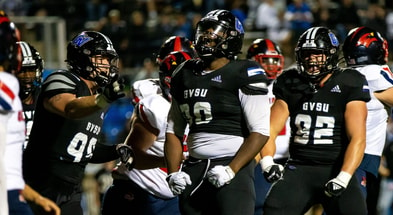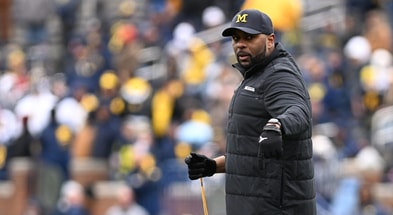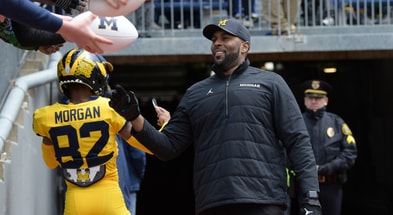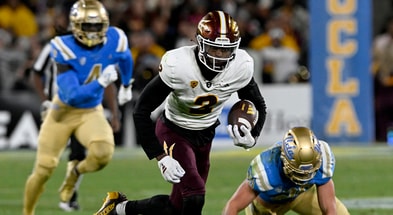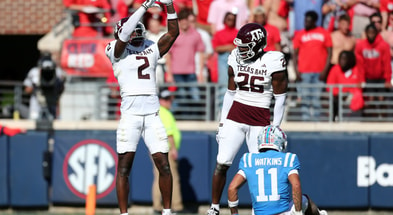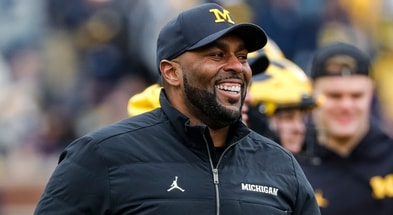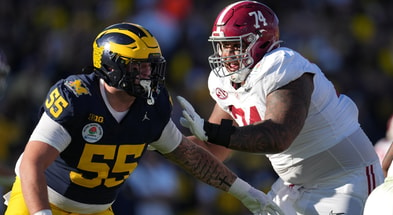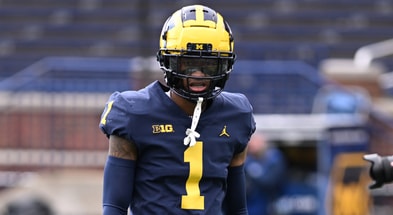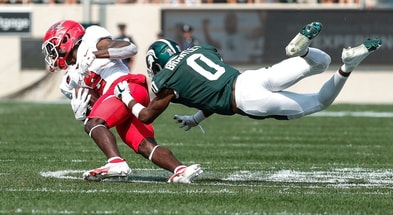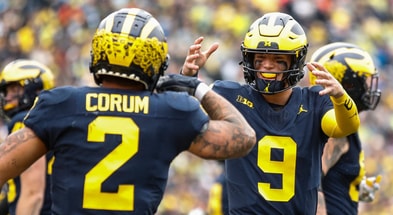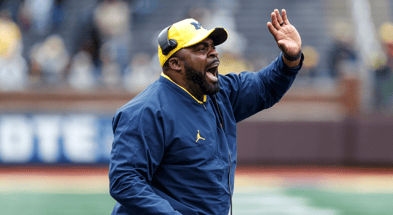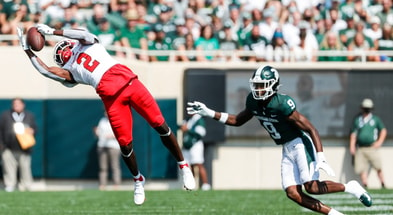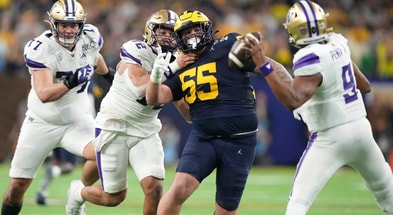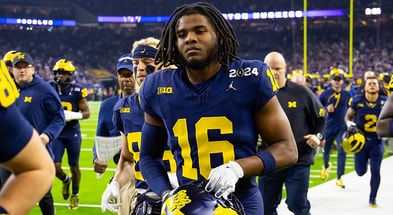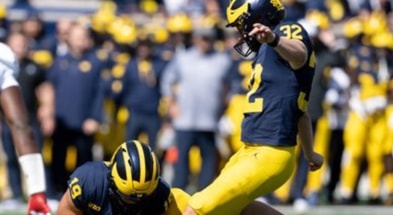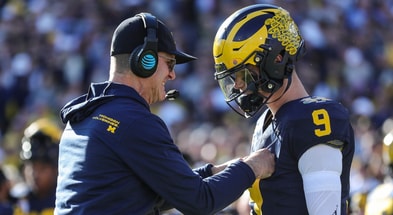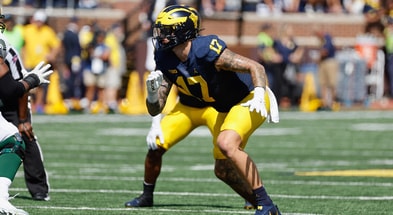What kind of advantage does sign-stealing give? Those in the football world weigh in
Michigan Wolverines football is under NCAA investigation for alleged illegal off-campus, in-person scouting to obtain opponents’ signals. According to reports, analyst Connor Stalions sent ‘scouts’ to more than 40 games played by 10 opponents beginning at least with the 2022 season to gather intel and video of play-call signals.
Despite numerous leaks from multiple national media outlets, there is no reported evidence so far that other Michigan staff members, including head coach Jim Harbaugh, were aware of the Stalions-led operation. In fact, The Washington Post, which received information on a private investigative firm’s findings that were presented to the NCAA, said no direct link to Harbaugh has been found.
RELATED
• Michigan football, Connor Stalions and the NCAA: Frequently asked questions, facts and more
• Michigan football, the 3-2-1: On the major questions about the NCAA vs. Michigan – is the worst known? What’s U-M’s next move?
In a seemingly coordinated effort, the Michigan program has been in the news, making national headlines, over the last week. ‘Sign-stealing’ has a negative connotation, particularly since the MLB’s Houston Astros ran an elaborate scheme in 2017, when they won the World Series and illegally utilized electronics to steal signs in-game.
The Michigan case isn’t that, or even close, according to prominent individuals in the football world.
The NCAA bylaw that Michigan potentially broke says that “off-campus, in-person scouting of future opponents (in the same season) is prohibited.
In 2021, the NCAA explored eliminating the rule, that was created in 1994 as a cost-cutting measure, not because in-person scouting provides an unfair advantage. The NCAA’s working group noted in its report that “the regulations governing scouting of opponents are not of national significance. Widespread availability of video would suggest minimal competitive advantage would be gained from in-person scouting and would be offset by the coach’s diversion from other coaching responsibilities.”
Now, since Michigan allegedly engaged in off-campus scouting — if the ‘scouts’ sent to games are deemed university personnel — many times over a long period of time. Those many potential minor violations could add up. And there could be more uncovered on who knew what, when. Harbaugh, too, is responsible for knowing what’s going on within his Michigan program and could still receive some form of punishment if rules were broken.
Sign stealing, meanwhile, is part of the game in college football, unlike the NFL, where coaches are able to communicate play calls into a player’s helmet. Staff members scour all-22 and television footage in advance of games and have a high level of success in decoding signals. Given that it’s common, teams often change their signals from week to week or even in the middle of games.
Below, we look at different perspectives from around the football world on sign stealing:
Isaiah Hole, Wolverines Wire and Locked on Wolverines podcast
Stalions is/was Michigan’s ‘guy’ when it came to stealing signs. And the Wolverines aren’t alone in having staff members at least partially dedicated to the practice. Hole outlined what he learned from a source within the Big Ten Conference.
“I actually spoke to a Big Ten source, who gave me a quote — if other people are out there sharing anonymous quotes and these ESPN and SI articles, I can too. So, here is what I learned, ‘Every Sunday, coaches and support staff with mutual connections throughout the conference contact each other to trade not just schematic notes, but also to trade signals. Some of the top teams who consistently trade signals and have very accurate information on common opponents are Michigan, Rutgers, Ohio State, Indiana, and Purdue. Other teams who are decent at it and would always look to trade are Illinois, Northwestern, Maryland, Minnesota, and Penn State. Wisconsin was oblivious to it but is likely no longer with the new staff. Michigan State, Iowa, and Nebraska appear to be oblivious and out of the loop.’
“Obviously, we keep on hearing all these things on Michigan from the last several days, sign stealing, how illegal is what Michigan did? How not illegal it might be. Is it a gray area? We are obviously firmly in the belief that it is a gray area, from everything we’ve heard in the last — even before this all started.
“That’s interesting, especially when you look at the other teams involved. Obviously, there’s one tier 1 team, and that’s Ohio State. Then you have the Tier 2 teams, and they vary in the ‘pretty good.’ I think it’s funny when you hear that Michigan State, Iowa and Nebraska are not at all involved in that. That’s kinda funny in a way. We’ve been covering just how deep sign stealing goes. But this is more than just sign stealing; this is trading and different things that go along with it. Obviously, Michigan is doing a pretty good job of it. That’s why Michigan is the center of college football at the moment. It’s because of the Connor Stalions drama that’s currently, continuously unfolding.
“This is not just something that … it’s hiding in the shadows when it comes to fandom. But when it comes to the actual, what’s happening behind the scenes, this is a well-known network. This isn’t just like, OK, maybe there’s someone — no, this is an established network. This is well-known with coaches [or staff members] that trade these things.
“What I think is interesting is not just the teams that are named, but also the idea that when you’re reading these things from ESPN that say, hey, 12 Big Ten teams have confirmed all of these shenanigans going on. Clearly, they’re not so concerned with Michigan’s sign stealing that they aren’t willing to not trade, they’re not willing to stop the sign stealing — and they’re also potentially benefactors to it. If Michigan is doing something elicit and it actually helps, whether it’s illegal or a gray area, whatever it might be, Michigan’s not actually blackballed with this, right? That’s interesting, as well.
“The other note I wrote down from my conversation, ‘Each team knows who each team’s person is, and they have their phone number.’ So, this is a pretty common practice, and clearly this also suggests that teams aren’t necessarily as afraid of Michigan as they are publicly proclaiming — or, I should say, anonymously proclaiming. This gives credence to, ‘Michigan is annihilating everything in its path. What can we do in order to kind of keep Michigan from achieving its goals?’”
Deion Sanders, Colorado head coach
Sanders sheds some light on the difference between football and baseball, which is extremely important. In football, players don’t know what’s coming, even if the coaches’ play calls are informed by what they believe the opponent is running. In baseball, with what the Astros did, the players at the plate actually knew (or had a great idea) what kind of pitch was heading their way.
“Everyone’s trying to get an edge,” Sanders said. “Everyone is trying to get whatever edge they can. You could have someone’s whole game plan — they could mail it to you — you still gotta stop it. You still gotta stop it. In football, it’s not as pronounced as baseball. If I know a curveball is coming, I got you. With football, I don’t give a darn if you know a sweep is coming, you still gotta stop it. Physically — it’s a physical game — you still gotta stop it. So, that’s a little tough.
“I don’t buy into all that stuff, that someone was stealing this, stealing that. I don’t buy into a lot of that stuff. You’ve still gotta play the game. Back in our glory days with San Francisco, as well as the Cowboys, you know darn well Emmitt Smith is getting the ball, you know darn well Mike Irvin is running the comeback, you know darn well Jay Novacek is going to do what he’s going to do — and you couldn’t stop it. Is what it is.”
Jeff Saturday, ESPN analyst
Saturday, a former NFL center, two-time All-Pro and former Indianapolis Colts interim head coach, had one of the strongest takes against the Michigan allegations.
“This thing has gotten ridiculous,” Saturday said on Get Up. “We all played this game for a long time. Every team is stealing signs — trying to. And every team is trying to steal checks [at the line of scrimmage]. They’re listening to TV copies about how quarterbacks are audibling in the meeting room. All of this information, you’re trying to gather. You understand as a football player it’s happening, and every team is doing it.
“So, one team [Michigan] is getting singled out. It’s just nonsense. What [Colorado head coach] Deion [Sanders] is saying is true. It is a game about physicality. It don’t matter what you know, it’s can you stop it and can you execute it? We’re all trying to look at DBs, seeing what codes they’re giving each other so we know where the blitz is coming from. ‘Louisville,’ ‘Roger,’ we know he’s trying to go one direction or the other. The way this thing has taken a life of its own is absolutely ridiculous.”
Todd Blackledge, NBC Sports analyst
Blackledge is the NBC analyst that called Michigan’s 49-0 win over Michigan State Saturday night in East Lansing. He also played quarterback at Penn State and was the No. 7 overall NFL Draft pick in 1983.
“Look, everybody is trying to steal signs,” Blackledge said. “This is not new, it’s not uncommon. Everybody’s looking for some form of competitive advantage, whether they’re doing it off of game film of previous games or in-game as the game is unfolding. That’s why teams are constantly changing their signals through the course of the season, because they know this is happening. It’s a common practice. It’s not illegal. But, the things that Michigan is accused of doing — in-person scouting, which never was illegal until 1994, and using some kind of electronic or recording devices — those things are illegal. If it comes to be that they proved that this is true, then there should be some consequences for Michigan. I don’t know what extent those consequences would be, or when they would be ever be able to enforce it or make it happen. The allegations are that they crossed the lines on a couple of things, and if that’s true, there should be some consequence for it.
“However, and I said this on the air, I don’t think this should take away anything of how good this Michigan football team is — how talented they are on both sides of the ball, how much depth they have at all three levels of their offense and defense. This is an outstanding football team that is playing great football, and I really don’t think stealing signs or if they were able to ascertain signals is making that much of a difference, if any, in how they’ve played this year.”
Brady Quinn, FOX analyst
The analyst and former Notre Dame quarterback has been around the game a long time, and noted that other fan bases should be hesitant when casting blame on Michigan.
“Here’s where I get skeptical of it. Other teams do this, [but] they just haven’t been caught,” Quinn said. “Sign stealing has gone on forever.
“You want me to give you the simple solution to all of this? Coach the quarterback. Do exactly what they do in the NFL. There you have it. You speak into the helmet, tell the quarterback what the play is. You speak into the helmet, tell the linebacker [or] whoever it is on defense what the defense is. Done. Done. You don’t have to worry about it. This is now a non-issue if you want to get rid of it. So, all they have to do is make that subtle change, and this is never an issue for any teams moving forward. No idea why the NCAA wouldn’t implement a rule like this.
“Beside that point, there are other schools and teams that do this, and clearly they’re just better at getting away with it. But it feels like, for the background of a guy like Connor Stalions has, as a very reputable decoder, that he would’ve been so sloppy with how he did this. He’s got his name in buying some of these tickets to opposing schools. I’ll just put it this way, we’ve all got friends who gambled before it was legal to gamble. Not many of them were using their real name — whether it’s an off-shore book or whatever account they had. Why would you think, then, that a guy is ‘the guy,’ supposedly, to steal signals at Michigan, why would you think that he’s going to use his name and put himself at risk, knowing what he was doing is illegal?
“The whole thing seems really fishy — every little piece of it. And I know there are probably Ohio State fans that are like, ‘Oh, it’s Michigan. They cheat.’ Well, be careful. Be careful now. I’m just telling you, a lot of coaches that I talk to don’t want to talk about it or make any public accusations for a reason. For a reason. And anyone who’s out there saying, ‘Oh, this doesn’t happen, it’s just Michigan,’ they’re lying to you or they’re ignorant to how the game of football is today, at least at the college level.”

